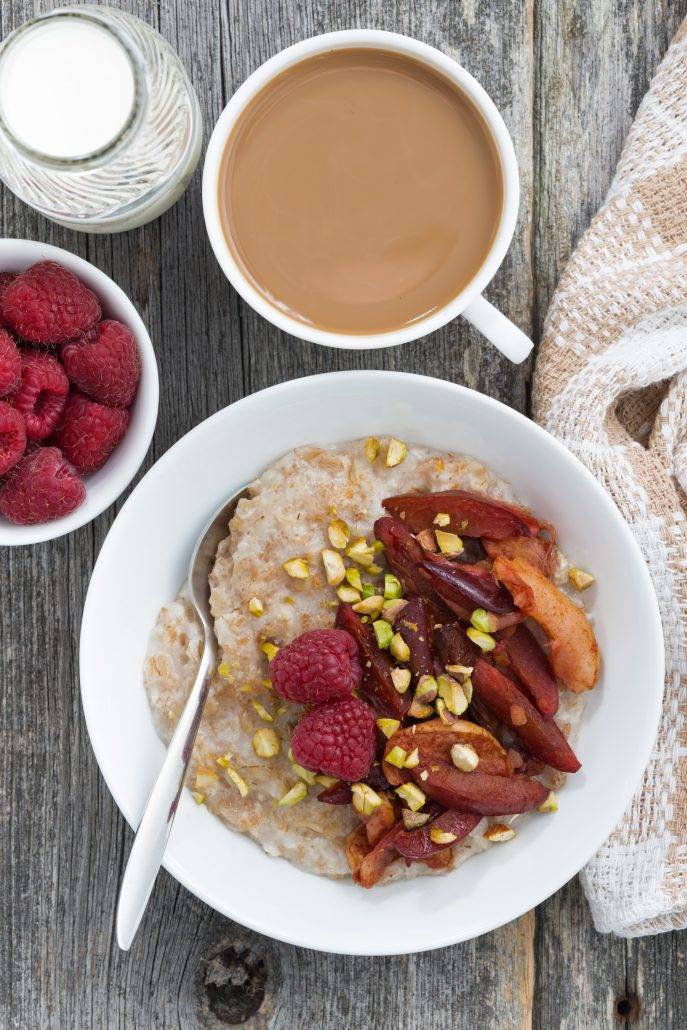Should You Eat Breakfast? Our Nutritionist Vs. The New York Times

A recent New York Times article cited a study published this year by James Betts, an associate professor of nutrition and metabolism at the University of Bath in England, stated there is “no difference in weight change…between people assigned to eat breakfast for six weeks and those assigned to skip it.”
The article went on to say, “Dr. Betts said that, unlike randomized trials, observational studies of breakfast consumption could be misleading. They show, for example, that people who eat breakfast also follow other behaviors associated with good health. They tend to drink and smokeless, consume less sugar, eat more fiber and exercise more than those who skip a morning meal.”
The premise of the article raised some flags for us here at Mountain Trek because one of the main beliefs at our award-winning health retreat is that eating breakfast within thirty minutes of waking is essential. Doing so helps kickstart your metabolism and gives your body the energy it requires throughout the day. So, we sat down with Mountain Trek’s nutritionist Jennifer Keirstead to review the article and report carefully and then discussed the factors the study was missing and whether breakfast is, in fact, good for you.
You’ve had a chance to read the New York Times article. What was your first impression?
I was really surprised. I know there’s a movement right now with “Bulletproof” coffee which encourages people to put two tablespoons of coconut oil or grass-fed butter in their coffee every morning and that’s supposed to act as their breakfast and boost their metabolism. That concept, as well as the concept of skipping breakfast entirely, goes against a lot of what we teach at Mountain Trek.
What would be your retort to this article?
From a common-sense aspect if you start your day with a healthy meal it sets the stage for the rest of the day. I hear time and time again from our guests that when they skip breakfast and just end up picking at sugary things and jacking themselves up with caffeine and coffee it leads to over-eating later in the day when you’re less likely to burn those calories off.
So breakfast is important?
Absolutely, for those reasons I’ve already mentioned but also for metabolism. At Mountain Trek, we encourage people to balance their hormones to support their metabolism and by eating breakfast they can boost their anabolic (their good, calorie-burning) metabolism by 15% because it helps keep cortisol levels down which is that stress hormone that leads to catabolic hormonal responses. By keeping that cortisol hormone down it’s a way of communicating to the body that, “I’m going to feed you and look after you and you don’t have to go into that famine response when you store and hold calories and you’ll have sustained energy throughout the day.”
Perhaps the study cited by the Times needs to be put into better context?
I read the New York Times often and some of my favorite writers and health experts write for them. I guess I just don’t agree with the idea of this particular story that not eating breakfast is going to benefit someone’s weight and overall health long term. Also, the question needs to be asked, what are the people in the study consuming instead of breakfast? Just coffee? Caffeine has a dramatic effect for a third of the population by increasing their cortisol levels. For another third of the population, it suppresses appetite, which people might think is great for dieting but really if you’re suppressing your appetite in the morning when you’re metabolism is its highest you want calories coming in at the earlier part of the day because you’re more likely to burn them off than eating a late lunch and a huge dinner before bedtime. And finally, caffeine affects a third of the population and their ability of insulin to unlock glucose and stabilize sugar. So we believe there are different negative effects caffeine has on people and if that’s all you’re having for breakfast and you’re not taking in whole foods then there’ll be long-term impacts.
So it sounds like this article and the report aren’t telling the whole story.
Yeah, it’s taking a snapshot and showing a small portion of people who didn’t gain weight when they skipped breakfast for six weeks. But what it’s not showing is the quality of life and energy levels after that time period. Your energy levels are going to drop when you skip meals and that’s going to affect your thinking. You won’t be as productive at work. You won’t have the energy to do that brisk walk around the park at lunchtime.
What is Mountain Trek?
Mountain Trek is an award-winning health retreat immersed in the lush nature of British Columbia. Our one or two-week program—featuring daily hiking, yoga, exercise classes, time in our state-of-the-art spa, and of course, delicious, healthy cuisine—will help you detox, unplug, recharge, and roll back years of stress and unhealthy habits. To learn more about the retreat, and how we can help you reset your health, please email us at info@mountaintrek.com or reach out below:

